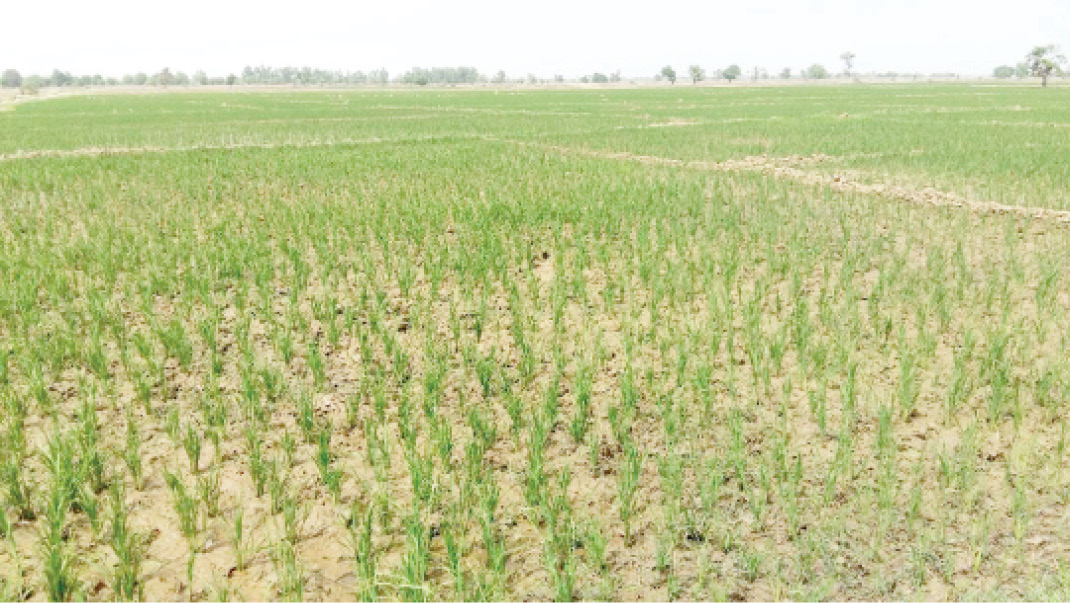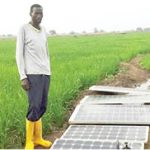Farmers experienced rain stoppage in July, August
For some time now, the northern part of the country has been witnessing severe flood disasters that have destroyed over 450,000 hectares of farmland, estimated at over N1.5 billion loss, according to farmers’ associations.
Yam farmers appeal for help as drought persists in Plateau South
Foundation, ABU partner on worm-drought-resistant maize
However, as the flood disasters are taking a toll in the North, the South-West is witnessing another monumental disaster, drought, just when crops like maize, rice, etc are seeding.
These phenomena, stakeholders say would further strain the country’s ability to produce more this year, prompting calls for more investment in irrigation facilities across the country to make up for any shortfall during the rain-fed season.
Our correspondents report that farmers in the South-West are in pain as they watched their investments struggling.
Farmers in Ondo State are now groaning over the absence of rain for about two months which, they said, has affected their crops and food production.
There was a total cessation of rainfall between July and August 2020, a situation that has caused a change in the entire rainy season activities.
Apart from wells that have dried up in many communities, farm crops also suffer a similar fate due to lack of water.
Most communities in the 18 LGAs of the state were affected, forcing the prices of foodstuffs, especially gari, to increase.
In some areas in Akoko, such as Epinmi, Afin Akunu, Ajowa, Oka Iye among others, farmers lamented their ordeals.
Alhaji Abu Balogun from Afin Akoko North-West Local Government Area of Ondo State described the situation as worrisome as farmers are faced with uncertainty in the repayment of agricultural loans obtained to plant crops this year as the crops had been destroyed due to lack of rain.
He, however, noted that resumption of normal rainfall will minimise their losses.
Another farmer from Epinmi Akoko, Mr Mukaila Ayodele, explained that the fertiliser he applied on his maize farm, which didn’t dissolve due to lack of rainfall, will negatively affect harvest.
Mr Issac Ikuomola, a cassava farmer in Akure, lamented that farm production this year is likely to be low compared to other years.
He envisaged a hike in food prices that would worsen the suffering of the people due to the poor economy.
Rev Cannon Isaac Awowole, on his part, called for prayer by the citizenry to avert the impending ugly situation.
Similarly, Alhaji Basiru Aminu called for fervent prayers to seek the face of God for change in the sad situation.
In Oyo State, the chairman, All Farmers Association of Nigeria (AFAN), Engr. Olumide Ayinla, told Daily Trust in Ibadan that cessation of the rains in the latter part of July and the whole of August in the state had caused crops to burn in the farms, especially maize.
“I feel for our members, especially the maize farmers.
“Their losses cannot be quantified.
“I am sure it is millions of naira. I think it is time government at all levels support them because many of them are now in serious debt.
“All of them have to start all over again.
“They have to plant their crops again.
“Here in the South-West, farmers do not feel the effect of the federal government at all,” he said.
He warned that “The effect of this year’s stoppage of the rains would be grave.
“Even when we had enough rain, there was not enough food.
“Many times we depend on the North for food.
“Now that we had rain cessation, the effect would be tougher when it is time for harvest.”
Also speaking on the development, Oyo State chairman of the Maize Farmers Association of Nigeria, Mr Raji Isa-Ayandele, said the people of the zone should expect drastic reduction in farm produce/output at harvest.
He said: “This is where the government should come in.
“Though meteorologists have told us that we are going to have late rains this year, but we cannot as a result of that stop planting since we don’t have other means of survival.
“Our people have lost millions to the cessation of rain.
“The North is now ahead of us because they invested in irrigation.
“I wish the federal government can launch irrigation systems across the country to support those of us in the South,” he said.
In Ogun State, farmers who spoke to Daily Trust on Sunday said that the state experienced cessation between June and late August this year, “a time that crops needed water most for germination.”
The state chairman of AFAN, Prince Olusegun Dasaolu, told Daily Trust on Sunday that the development portends danger for food production.
“The worry now is, will this rain extend beyond the time that it normally stops?
“If it does, farmers might have the opportunity of planting and harvesting.
“But if stops suddenly and the dry season commences, that portends danger for food production,” he said.
On his part, the state chairman of the Rice Farmers Association of Nigeria (RIFAN), Lawrence Olalekan Osunkoya, described the development as devastating.
Going forward, he called for government support through the implementation of irrigation farming to tackle rain cessation.
Osunkoya said, “It was devastating. Our farmers lost a lot.
“The rain stopped at a time the rice needed it to germinate.
“Unfortunately, we can’t plant again for the year.
“For Ofada rice, it is just for four months and we are in September already.”
In the North Central, rice farmers in some parts of southern Nasarawa State are also lamenting the effect of insufficient rainfall at the time rice is seeding.
They said the situation affected weed control and would certainly affect their harvest.

 Join Daily Trust WhatsApp Community For Quick Access To News and Happenings Around You.
Join Daily Trust WhatsApp Community For Quick Access To News and Happenings Around You.


